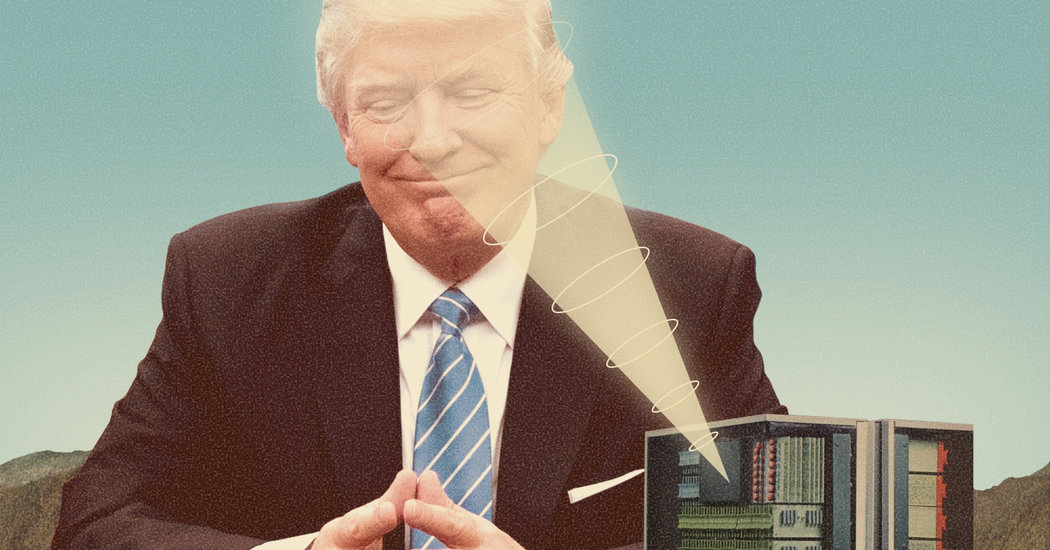Now up the stakes; instead of Go, Jeopardy, backgammon, poker and chess domination, ask a neural network to figure out the optimal strategy for the biggest game in town — the United States presidency. In this hypothetical, let’s input and analyze all available written and spoken word — from mainstream media commentary to the most obscure one-off crank pamphlets. After running simulations of various hypotheses, the network will serve up its suggestions. It might show Trump which areas of the country are most likely to respond to personal appearances, which rallies and town hall meetings will generate the greatest photo op and TV coverage, and which publicly manifest personality traits will garner the most votes. If it determines that outrage is the only road to the presidency, it will tell Trump when and where his opinions must be scandalous and offensively polarizing.
Further imagine that the Trump A.I. machine determines that the opinions most likely to get him elected have slim chances of being carried out once he is president. To the extent that traditional politicians are embarrassed by flip-flops or bound by ethical and moral values or both, they are likely to display a degree of restraint and hedging of controversial positions. Winning at any cost is at least partially balanced by underlying principles. Not so for a neural network. There is no cringe factor, no sense of anticipated embarrassment or humiliation with seemingly random changes of mind. There is no concern with subsequent disclosures of misrepresentations, falsifications and outright lies. As the U.C.L.A. Bruins football coach Henry Sanders, known as Red, once said, “Winning isn’t everything; it’s the only thing.”
Following the successful election, it chews on new data. When it recognizes that Obamacare won’t be easily repealed or replaced, that token intervention in Syria can’t be avoided, that NATO is a necessity and that pulling out of the Paris climate accord may create worldwide resentment, it has no qualms about changing policies and priorities. From an A.I. vantage point, the absence of a coherent agenda is entirely understandable. For example, a consistent long-term foreign policy requires a steadfastness contrary to a learning machine’s constant upgrading in response to new data.
A caveat to media gurus, historians and policy wonks: As there are no lines of reasoning driving the network’s actions, it is not possible to reverse engineer the network to reveal the “why” of any decision. Asking why a network chose a particular action is like asking why Amazon might recommend James Ellroy and Elmore Leonard novels to someone who has just purchased “Crime and Punishment.” There is no underlying understanding of the nature of the books; the association is strictly a matter of analyzing Amazon’s click and purchase data. Without explanatory reasoning driving decision making, counterarguments become irrelevant. The most cogent reasons that solar power is preferable to burning coal will fall on deaf circuits as long as the Trump network continues to determine that Trump is doing a great job.
To know how this network assesses his performance, we need to know what basic positive and negative values Trump has inputted, and how they might compete with one another to determine whether or not he’s succeeding. It is easy to come up with a list of likely motivating goals such as power, money, brand-name recognition, public praise, vindication, retribution and idolization. As recent history has shown us, these goals seem to vary from moment to moment. Unfortunately, a constantly shifting definition of what constitutes “winning” further increases our inability to predict his behavior.
A bitter irony: Criticism may have unintended positive rather than negative effects. In a poll last month, nearly 90 percent of Trump voters felt that media criticism of Trump only reinforced their view that the president is on the right track. As neural networks have no concept of fault, a failure of a policy won’t be seen as illogical or ill conceived. Failure just means that you need to try another strategy (or get new staff members — as suggested by his advisers’ phenomenally short half-life).
As armchair psychologists, we have the gut feeling that with enough information and psychological savvy, we can figure out what makes Trump tick. Unfortunately there is no supporting evidence for this wishful thinking. Once we accept that Donald Trump represents a black-box, first-generation artificial-intelligence president driven solely by self-selected data and widely fluctuating criteria of success, we can get down to the really hard question confronting our collective future: Is there a way to affect changes in a machine devoid of the common features that bind humanity?
An earlier version of this article misspelled the name of a popular crime novelist. He is James Ellroy, not Elroy.
By ROBERT A. BURTON
https://www.nytimes.com/2017/05/22/opinion/donald-trump-our-ai-president.html
Source link



